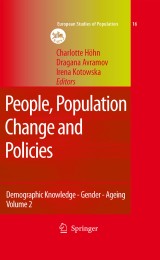Details

People, Population Change and Policies
Lessons from the Population Policy Acceptance Study Vol. 2: Demographic Knowledge - Gender - AgeingEuropean Studies of Population
|
149,79 € |
|
| Verlag: | Springer |
| Format: | |
| Veröffentl.: | 08.03.2008 |
| ISBN/EAN: | 9781402066115 |
| Sprache: | englisch |
| Anzahl Seiten: | 348 |
Dieses eBook enthält ein Wasserzeichen.
Beschreibungen
European countries, including the DIALOG countries, have faced a major de- graphic change and transition in the last thirty years. They are experiencing lo- term downward trends in fertility, leading to demographic ageing. Fertility rates are now below replacement level in nearly all countries. As a result, natural p- ulation growth rates are starting to decline, or population sizes are falling o- right. At the same time, the proportion of elderly dependants continues to grow while the working-age population declines in absolute and relative terms (see Kontula and Miettinen 2005). Moreover, net immigration, which potentially could offset declines in working-age population, remains generally low in most European countries (Grant et al. 2004). There are a great number of societal problems that arise from this demographic transition. The International Monetary Fund (2004) argues that the impact of - coming demographic changes on economical growth could be substantial. The h- toric association between demographicand macro-economicvariablessuggests that the projected increase in elderly dependency ratios and the projected decline in the share of the working-age population could result in slower per capita GDP growth, and lower saving and investment (IMF 2004, 147). For example, the estimates s- gest that demographic change could reduce annual real per capita GDP growth in 1 1 advanced countries by an average of / % point by 2050, i. e. , growth would be / % 2 2 point lower than if the demographic structure had remained the same as in 2000 (IMF 2004, 147).
Demographic Trends, Population Related Policies and General Attitudes.- Demographic Change and Family Policy Regimes.- Demographic Knowledge and Evaluation of Demographic Trends.- Who Should Take Care for Them?.- Changing Attitudes on Population Trends and Policies?.- Comparative Delphi-study.- 2030: Another Europe?.- Action Programs of Socio-political Actors.- Making Dialog Possible.- Gender Roles.- Family-related Gender Attitudes.- Gender and Fertility.- Intergenerational Solidarity and Elderly.- Attitudes Towards Population Ageing and Older People.- Activating Older Workers: Policies Versus Opinions and Expectations.- Only Fools Rush In?.- Policy Implications and Conclusions.- The Need to Adapt and Reform Social Policy: Setting the Stage for Effective Population-friendly Policies.- Conclusions.
<p>This two-volume work presents social cohesion and demographic challenges that are associated with low birth rates and population ageing. It does so from the perspective of citizens and key policy actors. The work analyses peoples’ attitudes about demographic trends and expectations towards private networks and public policies. It places these in the societal context of national specificities in the fourteen countries and regards them as part of the dynamics of the European integration process.<br>Volume 2 focuses on research findings related to general knowledge of people concerning demographic developments, gender issues, and ageing. In addition, it presents the results of a Delphi-Study on the views of key policy actors in the area of demographic developments. The volume concludes with policy implications of the findings, and a reflected overview of all results collected in the two volumes of this work.<br>This book is the outcome of the DIALOG research project, funded by the European Commission under the 5th Framework Programme.</p>
International comparative analysis of surveys on demographic change based on about 34000 interviews in 14 European countries Lessons drawn on what future demographic trends will bring and what will be the consequences for the family, children, equal opportunities and the ageing of the population

















